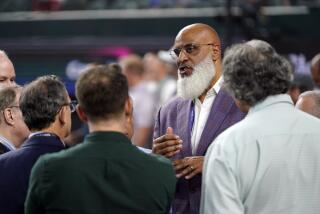Baseball Players Make a Pitch : Labor: Owners cool to union proposal of cost control and partnership that does not address salary cap or free agency.
- Share via
RYE BROOK, N.Y. — The Major League Baseball Players Assn. presented a proposal to the owners Saturday that union leader Donald Fehr said addresses management’s desire for cost controls and a partnership with the players, but the chairman of the owners’ negotiating committee seemed to express doubt.
John Harrington, chief executive officer of the Boston Red Sox, said in a statement the owners were encouraged by player concerns about their “mutual self interest in growing the game through a lasting relationship,” but “we have consistently told the union (that) the clubs must evaluate any proposal based on the following:
“Does the plan address cost certainty? Does it result in reduction of player costs from 58% of revenue to 50%? Does it deal with payroll disparity and encourage competitive balance?”
Harrington and his committee met Saturday night to study the proposal, but in raising those familiar questions he seemed to suggest that it is unlikely to provide the framework for a negotiated settlement before the owners meet in Chicago on Thursday to implement a salary cap.
Although a management source said the owners would probably have a counterproposal today, an anguished union lawyer said, “They’ve already . . . on it.”
The proposal was formulated during the recent three-day meeting of more than 80 players in Atlanta. Special mediator William J. Usery expressed displeasure that Fehr, surrounded by a committee of 15 players, called a news conference here to release the details after presenting it to the owners.
“In any mediation I’m delighted when one or the other side makes a proposal or counterproposal, but the negotiations have to take part across a table, and when the details become fodder for public debate it makes a very difficult dispute even more difficult,” Usery said.
Said Fehr: “Bill did ask us to consider not doing it, but there was such tremendous anticipation (of the details)--among the media and our membership--that I felt we had no choice.”
Fehr said his economists estimated that the plan could save the owners $100 million in salaries over the three-year period that the union has proposed the revenue-sharing phase stays in place--”the drag on salaries that the owners keep talking about,” he said.
The essential points:
--Based on 1994 figures, the union proposes a tax on all payrolls of about 5%, generating about $35 million to be shared with small-revenue teams. It also proposes making American and National league gate splits uniform. American League home teams now keep 80%, with the visitors getting 20%. The NL split is about 95-5.
The union proposes making it 75-25, generating another $23 million for the clubs to share. Added to the $35 million, the total becomes $58 million, which matches the total owners agreed to share when they finally agreed to revenue sharing at a January meeting in Ft. Lauderdale, Fla.
“We have responded directly to the club’s stated desire for a revenue stream of $58 million without destroying the market,” Fehr said. “More importantly, our plan would produce that $58 million immediately. The owners’ plan is to be phased in and doesn’t produce it until the fourth year.” (The owners’ plan, however, is linked to the salary cap that is conspicuously absent from the players’ plan).
--The union proposes an industry growth fund of at least $60 million, with the players taking $30 million from their licensing revenue and the owners matching it from expansion fees. The fund would be administered by four players and four owners, with the money used for joint marketing and developmental projects, including stadium improvement where needed. The potential growth, Fehr said, would make it possible to dissolve the revenue-sharing facet after three years.
--The union also proposes that the players have a voice in virtually all other major industry decisions, urging immediate hiring of a commissioner and expansion by 1998.
“For the first time in history, the players are investing their own money to ensure the future of the game,” Atlanta Brave pitcher Tom Glavine said.
Perhaps, but it seems doubtful the owners will find common ground in a proposal that makes no changes in free agency or arbitration and does not seem to include the desired spending disincentive represented in a straight cap or high tax rate.
More to Read
Go beyond the scoreboard
Get the latest on L.A.'s teams in the daily Sports Report newsletter.
You may occasionally receive promotional content from the Los Angeles Times.










